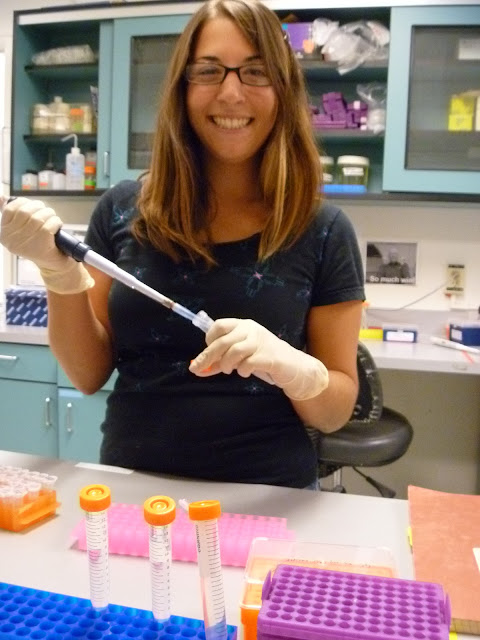Next up for Get to Know a Grad Student: Juli Goldenberg, Masters student at San Diego State University
 |
| Juli in her native environment. She is demonstrating the extremely difficult "No-look pipette transfer". |
What kind of research do you do? Please give the scientific version and the non-scientist version.
(science-y version)The broad goal of my research is to improve coalescent-based methods of multilocus species tree inference and species delimitation. Specifically, my project focuses on elucidating the species limits and phylogenetic relationships within the Western Rattlesnake (Crotalus viridis) species complex - a wide-ranging group of rattlesnakes that currently contains three recognized species and nine subspecies.
(non-science-y version)My research focuses on elucidating the evolutionary history of the widest-ranging group of venomous reptile in North America, the members of the Western Rattlesnake species complex. Using genetic data, I am trying to determine where the species limits lie within this group, and I will be using these new species groupings to reconstruct the species tree of the complex.
 |
| A western rattlesnake (Crotalus viridis) found while night driving in Arizona this summer. |
Why is what you study important?
Evolutionary biology lies at the root of every biological science. I love observing the genetics and population genetics that underlie speciation because it is here that we observe the union of micro- and macro-evolutionary processes. I never lose my sense of amazement while working at this fundamental intersection!
Also, rattlesnakes are definitely the coolest study taxon.
| Looks rough. |
What was your path to graduate school like?
I first found that I wanted to attend graduate school through an education abroad program through UC Berkeley. During the first semester of my junior year of college, I had the opportunity to attend a field-based marine biology and terrestrial ecology program in Queensland,Australia. After exploring Queensland from the outback to the Great Barrier Reef, I was hooked on pursuing biology as a career. Upon my return to Berkeley, I spent the remainder of my undergraduate tenure assisting in a herpetology and evolutionary genetics lab, which cemented my desire to study evolutionary biology.
What do you enjoy doing in your free time? How do you feel about your work-life balance?
My number one hobby is brewing beer. You can follow all of my homebrewing adventures at brewbunny.wordpress.com (yep, shameless plug for my blog). Aside from that, I love exploring the outdoors - especially the beautiful Southern California deserts.
I am lucky enough to be studying what I love, so striking a balance between work and free time is effortless. I never feel like my work is a chore.
 |
| If you touch your chin, you may contaminate DNA samples |
Describe a normal day in your life.
A normal day for me usually consists of balancing lab work, reading, writing, various journal and lab meetings, seminars, helping out my fellow students as much as I can, and constant data analysis. In addition, twice a week I teach the night class for human anatomy. After work I usually have some sort of social activity set up, be it craft night, game night, or just grabbing a beer with some buddies.
What are your career plans for the future?
I’m currently in the last year of my masters at San DiegoState University. After I complete my degree, I plan to continue on to a PhD and eventually devote my career to evolutionary biology research, hopefully remaining in academia.
What has surprised you about graduate school?
I have been most surprised by how much I have learned that is not related directly to my research. I anticipated that my thesis would be central to my educational experiences during graduate school. Rather, I have learned more from coursework, teaching, seminars, and my fellow students than from anything else. This eye-opening and integrative perspective has dramatically changed my outlook on biology.
What do you struggle with the most in graduate school?
It was very difficult to find a balance among all of the seemingly disparate tasks required by graduate school. The first semester was definitely the most difficult for me because of this. Once I got settled in to graduate school, though, the work became a lot more fun.
 What has been the best moment of your career so far?
What has been the best moment of your career so far?The best moment of my career so far has definitely been giving my first oral presentation at a major international meeting. This past summer, I had the opportunity to present my research at the World Congress of Herpetology in Vancouver, BC, Canada. Although I was absolutely terrified at first, I ended up feeling so proud of my research, and the collaborative networking that resulted from the presentation was invaluable to my project.
How do you feel about the dynamic of research, teaching, and outreach in your career and in the future?
Integration of research, teaching, and outreach is essential to furthering any scientific field. Because of this, I have consistently maintained a volunteer relationship with natural history museums throughout my academic career, having volunteered at the Museum of Vertebrate Zoology in Berkeley during my undergraduate education, the California Academy of Sciences in San Francisco during my “year off”, and now the San Diego Natural History Museum. Research cannot persist without maintained public education and community outreach.
Who are your academic role models? Stephen J. Gould, Richard Dawkins, Theodosius Dobzhansky, LaurenceM. Klauber
| Dr. Stephen J. Gould with his pet stegosaurus (credit: famousscientists.org) |
What advice do you have for other aspiring grad students in your field?
If you are interested in pursuing a career in evolutionary biology, I think that the two most important steps you can take are talking to researchers currently involved in evolutionary research, and chronologically reading the “classics” of evolutionary thought (which is an incredibly fun pursuit!).
Thanks Juli! Next time we will have Chris Thawley, PhD student at Penn State University.
Hiç yorum yok:
Yorum Gönder